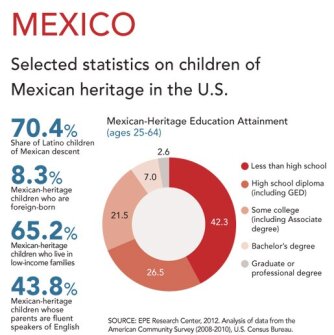It’s taken less than five years for Luis Mis Mis to learn two languages—English and Spanish—since arriving in San Francisco from his birthplace in the state of Yucatán in Mexico.
A Mayan Indian, Mis Mis, who is 18, is a bit atypical compared with most students of Mexican heritage attending school in the United States.
He was raised mostly by his grandparents, who spoke only the indigenous Mayan language. As a child, he rarely attended school and spent much of his time helping his grandfather work on the family’s small farm.
In 2008, when his mother came back to Yucatán to bring him and his siblings to join her and their father in California, he had not seen his parents for nearly 10 years.
In the United States, he landed at Newcomer High School in San Francisco, one of the nation’s oldest secondary schools for new immigrants. It has since closed down because of budget cuts. Speaking only a little Spanish at the time, Mis Mis struggled to communicate with teachers and fellow students, none of whom spoke Mayan.
After seven months at Newcomer High, where he learned Spanish from his peers and took English-as-a-second language courses, Mis Mis transferred to Abraham Lincoln High School, a large, comprehensive San Francisco high school where a majority of students are Asian-American.
He continued in ESL courses for another year and a half at Lincoln and was then reclassified as proficient in English—a remarkably short amount of time for an older immigrant student to learn the language.
Still, he needed a fifth year of high school to earn enough credits to graduate. But with the support of the administration at Lincoln High and the advocacy of Spanish teacher Suzann Baldwin and environmental science teacher Vanessa Carter, Mis Mis has been able to stay at Lincoln for an extra year. Without their assurances that he could stay another year, Mis Mis says he would have dropped out and sought a General Educational Development certificate, or GED.
Last year, he earned a 4.0 grade point average; this year, he’s enrolled in Advanced Placement Spanish with students who are all native speakers.
Mis Mis has never told his parents about his successes in school and has only shared a little with them about his ambitions: college and a career as a musician or an environmental science teacher. This spring, he’s been working with Baldwin, the Spanish teacher, to figure out how he can pay to attend a four-year college in California.
“I’m not sure they would understand,” he says of his parents. “They work really hard and probably want me to do the same thing to help out.”
Mis Mis spends all of his time outside of school “playing guitar, reading, writing, and working on my own to study and improve,” he says. “I want to have a good life.”










